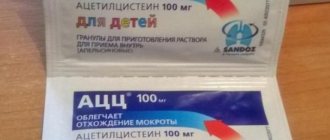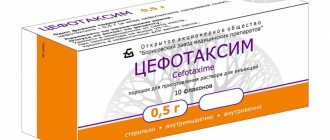ACC for children powder for preparation of solution 100 mg pack of 20 pcs
In patients with bronchial asthma and obstructive bronchitis, acetylcysteine should be prescribed with caution under systemic monitoring of bronchial patency. The use of acetylcysteine, especially in the initial stages of treatment, leads to dilution and, consequently, an increase in the volume of bronchial secretions. If the patient is unable to cough effectively, drainage or aspiration of secretions should be performed.
When dissolving acetylcysteine, you must use glass containers and avoid contact with metal and rubber surfaces.
When treating patients with diabetes, it is necessary to take into account that the drug contains sucrose.
Caution should be exercised when using acetylcysteine in patients with a history of peptic ulcer disease, especially with the concomitant use of other drugs that can irritate the mucous membranes of the gastrointestinal tract.
Cases of severe allergic reactions such as Stevens-Johnson syndrome and toxic epidermal necrolysis (Lyell's syndrome) have been very rarely reported with the use of acetylcysteine. If changes occur in the skin and mucous membranes, you should immediately consult a doctor and stop taking the drug.
Caution should be exercised when used in patients with histamine intolerance. Long-term treatment with acetylcysteine should be avoided in such patients, since acetylcysteine affects histamine metabolism and may lead to the development of intolerance symptoms (such as headache, vasomotor rhinitis, itching).
You should not take the drug immediately before bedtime (it is recommended to take the drug before 18.00).
The use of the drug should be avoided in patients with renal and/or liver failure to avoid additional formation of nitrogenous compounds.
Effect on laboratory data. Acetylcysteine may affect the results of colorimetric determination of the concentration of salicylates in blood plasma. In urine analysis, acetylcysteine can affect the results of determining ketone bodies.
Instructions for patients with diabetes: 1 sachet weighing 3 g corresponds to 0.24 XE.
Effect on the ability to drive vehicles and machinery: There is no data on the negative effect of the drug ACC® in recommended doses on the ability to drive vehicles and perform other activities that require concentration and speed of psychomotor reactions.
ACC syrup
Release form
Syrup . Transparent, colorless, slightly viscous, with a cherry odor.
Compound
Active ingredient: acetylcysteine (20 mg/ml).
Excipients: methyl parahydroxybenzoate, sodium benzoate, disodium edetate, sodium saccharinate, sodium carmellose, sodium hydroxide, 10% aqueous solution, “Cherry” flavor, purified water.
Pharmacological group
Secretolytics and stimulants of motor function of the respiratory tract.
Action
Mucolytic agent with expectorant action. Acetylcysteine increases the volume of sputum, facilitates its discharge due to a direct effect on the rheological properties of sputum, and has an anti-inflammatory effect by suppressing the formation of free radicals and reactive oxygen-containing substances responsible for the development of inflammation in the lung tissue.
Acetylcysteine: description of the substance
Indications
Respiratory diseases and conditions accompanied by the formation of viscous and mucopurulent sputum: acute and chronic bronchitis, tracheitis, laryngotracheitis, bronchiolitis, pneumonia, lung abscess, bronchiectasis, bronchial asthma, COPD, interstitial lung diseases and atelectasis due to blockage of the bronchi by mucus plug, sinusitis (to facilitate the passage of secretions), cystic fibrosis.
Inflammation of the middle ear, acute and chronic sinusitis, rhinosinusitis.
Contraindications and restrictions
- Peptic ulcer of the stomach and duodenum in the acute phase,
- hemoptysis, pulmonary hemorrhage,
- lactation period (breastfeeding),
- children under 2 years of age,
- hypersensitivity to acetylcysteine and other components of the drug.
Carefully
- history of gastric and duodenal ulcers;
- bronchial asthma;
- liver and/or kidney failure;
- histamine intolerance (long-term use should be avoided);
- varicose veins of the esophagus;
- adrenal gland diseases;
- arterial hypertension.
Application and dosage
Orally with additional fluid intake after meals.
The syrup is taken using a measuring syringe or measuring cup contained in the package.
- Adults and children over 14 years of age: 10 ml of syrup 3 times a day;
- children from 6 to 14 years old: 5 ml of syrup 3-4 times a day;
- children from 2 to 6 years: 5 ml of syrup 2-3 times a day.
For cystic fibrosis
- Adults and children over 14 years of age: 10 ml of syrup 3 times a day;
- children from 6 to 14 years old: 5 ml of syrup 4 times a day;
- children from 2 to 6 years: 5 ml of syrup 3 times a day.
For long-term illnesses, the course of therapy is determined by the attending physician. For chronic bronchitis and cystic fibrosis, the drug should be taken for a longer period of time to achieve a preventive effect against infections.
special instructions
1 ml of syrup contains 41.02 mg of sodium, which must be taken into account when using the drug in patients on a diet with limited sodium/salt intake.
Storage
In a place protected from light, at a temperature not exceeding 30 °C. Shelf life: 3 years. Once opened, store the bottle for no more than 18 days at a temperature not exceeding 25 °C.
Production
- Sandoz d.d. (Slovenia)
- Salutas Pharma GmbH (Germany)
- Pharma Wernigerode GmbH (Germany)
Package
A bottle of 100 or 200 ml along with a dosing device in a cardboard box.
Recipe
Available without a prescription.
Side effects
A number of side effects are likely to occur when using this drug:
- manifestations of allergies: rash, skin itching , urticaria , exanthema, angioedema , tachycardia , low blood pressure ; in very rare cases - Stevens-Johnson syndrome, anaphylactic manifestations, toxic epidermal necrolysis;
- respiratory system: in rare cases – bronchospasm, shortness of breath ;
- gastrointestinal system: abdominal pain, heartburn , diarrhea , vomiting, nausea, stomatitis , dyspepsia;
- sense organs: tinnitus;
- other manifestations: fever , headache ; in isolated cases - bleeding.
Contraindications
ACC 100 is prescribed in the following cases:
- hypersensitivity to acetylcysteine or to any other ingredients of the medicine;
- hemoptysis;
- pulmonary bleeding;
- exacerbation of peptic ulcer ;
- pregnancy and breastfeeding ;
- glucose-galactose malabsorption;
- lactase deficiency, lactose intolerance;
- child's age up to 2 years.
It is necessary to use ACC 100 carefully if there is a history of duodenal or gastric ulcers, in case of histamine intolerance, bronchial asthma, varicose veins of the esophagus, adrenal disease, obstructive bronchitis kidney failure , arterial hypertension .
pharmachologic effect
The substance acetylcysteine is a derivative of the amino acid cysteine . There is a mucolytic effect of this substance on the body. Under its influence, the process of sputum discharge is facilitated, since acetylcysteine directly affects sputum, in particular, its rheological properties. As a result, the viscosity of sputum decreases. The drug also provides an antioxidant effect, protecting cells from free radical oxidation that occurs during severe inflammatory reactions. It is active if the patient produces purulent sputum.
of glutathione , which is an important component of chemical detoxification, as well as the antioxidant system, improves
If acetylcysteine is used for the purpose of prevention, then in people suffering from cystic fibrosis and chronic bronchitis, the severity and frequency of exacerbations of bacterial origin are reduced.
Analogs
Level 4 ATX code matches:
Mukolik
Abrol
Ambrosan
Bronchorus
ACC 200
ACC Long
ACC
Mukolwan
Lazolvan
Bromhexine 8
Bromhexine 8 Berlin-Chemie
Bromhexine
Bronchobos
Carbocisteine
Erdomed
Pulmozyme
Pectolvan C
Halixol
Ambrobene
Acetylcysteine
Analog drugs of ACC 100 - ACC Long , Fluimucil , Acetylcysteine , Acetal , Acestad , Acestin etc. Only a specialist should choose the optimal drug.
Interaction
If ACC 100 is taken with other cough suppressants, mucus stagnation may develop due to suppression of the cough reflex. This combination of drugs should be used with caution.
Acetylcysteine enhances the vasodilatory effect of nitroglycerin when these drugs are taken simultaneously.
Acetylcysteine is not pharmaceutically compatible with antibiotics ( cephalosporins , penicillins , amphotericin B , Tetracycline , Erythromycin ) and proteolytic enzymes .
With simultaneous use, acetylcysteine reduces the absorption of cephalosporins, tetracycline, and penicillins. It is necessary to maintain an interval of at least two hours between taking these medications.
When acetylcysteine comes into contact with metals, rubber, etc., sulfides are formed.
Price ACC 100, where to buy
The price of ACC 100 is on average 250 rubles for 20 pieces.
- Online pharmacies in RussiaRussia
- Online pharmacies in UkraineUkraine
Pharmacy Dialogue
- ACC 100 (spike tab. 100 mg No. 20 for children) Hermes
RUB 233 order
show more
Pharmacy24
- ACC 100 mg No. 20 powder Salutas Pharma GmbH, Nimechchina / Lindopharm GmbH, / Zambon Switzerland Ltd, Switzerland
121 UAH. order - ACC 100 No. 20 tablets Salutas Pharma GmbH., Nimechchina/Hermes Pharma Ges.m.b.H., Austria/Hermes Arznaimittel Gmb.H.Nimechchina
116 UAH order
Indications for use
The use of ACC 100 is indicated in the following cases:
- diseases of the respiratory system in which viscous sputum is formed, which is difficult to separate ( acute, chronic and obstructive bronchitis bronchial asthma, laryngotracheitis , tracheitis , lung abscess , pneumonia, bronchiectasis, bronchiolitis );
- cystic fibrosis;
- acute and chronic sinusitis
- COPD;
- otitis media.

